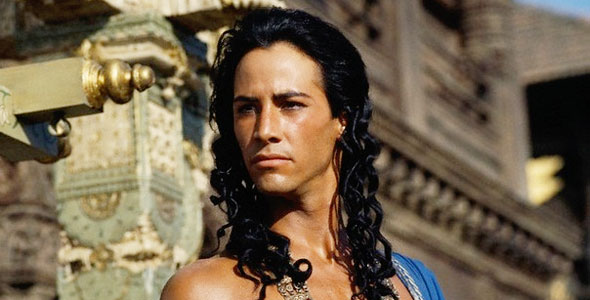You are pure illusion. You do not exist. | |
| Age: | 29 |
| Occupation: | The Buddha |
| Distinguishing Feature: | Being far more orange than any human has the right to be. |
| What He Taught Us: | The Four Noble Truths, the Eight-Fold Path, and how to spell 'Siddhartha'. |
keanugirl76
Even though Prince Siddhartha is not the main protagonist in Little Buddha, undoubtedly he's the leading thread of this movie. He enters the scene and comes out of it with elegance, humility and simplicity. His story is told as a sort of fairy tale and it's not pretentious at all, as it never overcomes - it doesn't want to - the rest of the movie. It's majestic and humble, just like the way the Hindu Prince indeed is.
He connects time and space - present America with present and old Bhutan - and people. Thanks to his story written a book, a modern child and his parents family get acquainted with him. His myth is the mean by which a group of monks spreads successfully their - and his - message: consider beings not for the way they look, but for their intimate essence; respect all the aspects of life by concentrating on any detail, as even the smallest has its own precise meaning and is part of the infinity; accept anything, included sorrow, disease and death, with humility and serenity, just as the local - modern and old - people do.
Indeed, in spite of extreme conditions of poverty and suffering, Oriental world is represented like a rich land, especially in warm colours like gold and orange - which can be noticed even on Siddhartha's skin - smartly used to represent the spiritual wealth of its inhabitants.
On the contrary, Western world is shown mainly in blue and grey, in order to emphasize its extreme rationalism and the lack of spiritual values in spite of rich material conditions. Jesse's house, for instance, is big and comfortable, but cold and dark as well.
Of course Prince Siddharta is predestined and gifted since his birth and he could have lived happy, protected and rich in his palace and become a great king, but it's his condition of humble, ordinary man - just like the ones he chooses to spend his life with - that, at the end, allows him to reach enlightenment. His humility, patience and tolerance are the weapons through which he faces the dark sides of life, such as threats, intimidation, temptation, doubt, fear. So unmoved and unperturbed he achieves great peacefulness and compassion, through self-detachment from illusions.
Keanu is great in this role. He's handsome - of course like classical princes should be - and very expressive. He doesn't talk a lot and he has to sit still most of the time, yet he manages to convey all Siddhartha's typical moral features just with a deep glance - which really seems to reach infinity - and a simple, peaceful smile. The portrayal of this mystique figure - as well as his complexity - in very few words and gestures, could have been a very difficult test for Keanu, who, on the contrary, passed it excellently.
This proves, once again, his versatility.
